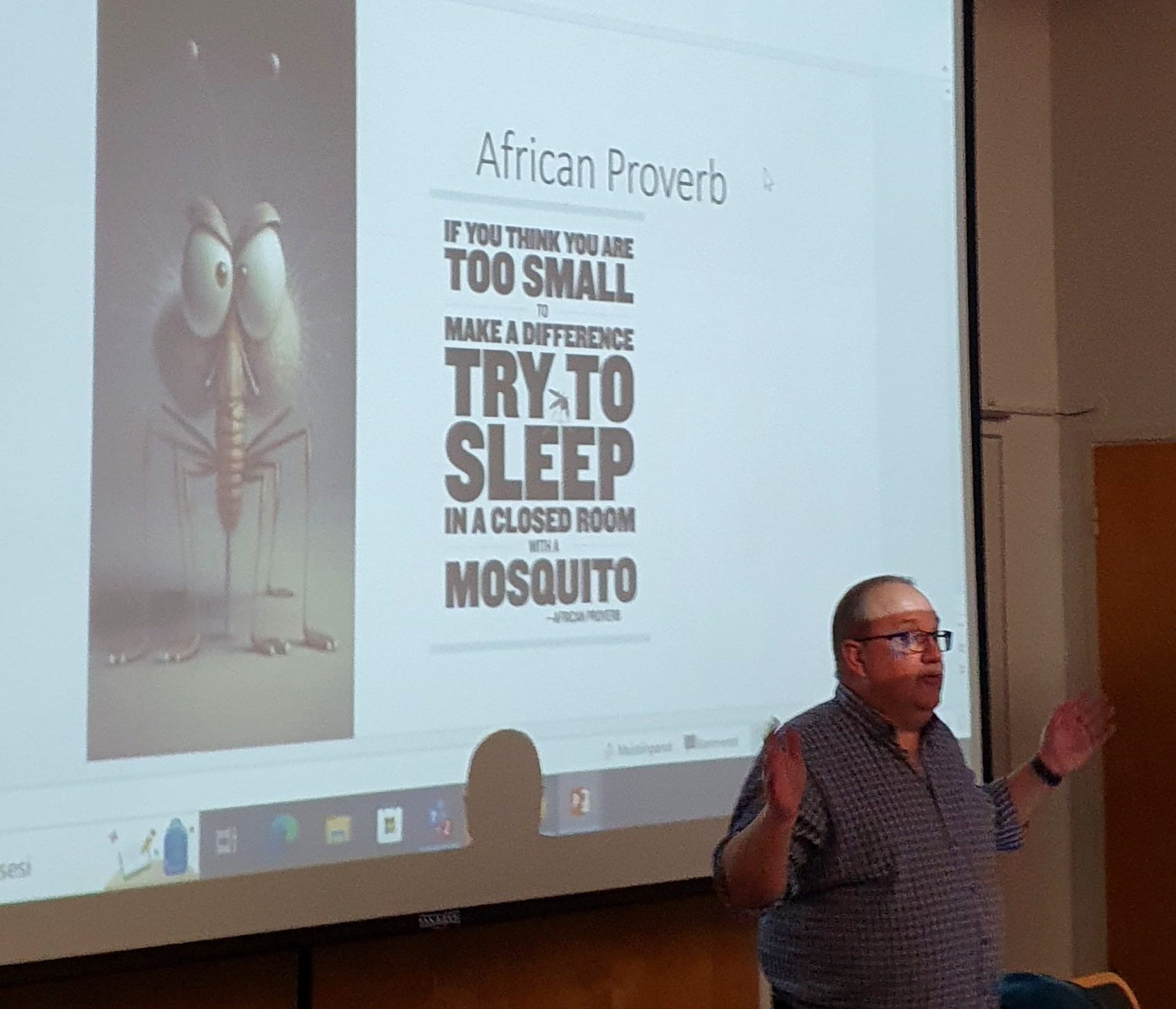Community Educator, be the mosquito!
Professor of Social Work Gary Spolander shows a plastic bottle with water and asks a question: ”What can you see here?”. Students in the Humak Turku campus auditorium start answering: ”It is half full.”, ”No, half empty.”, ”It is made of plastic.”, ”It is worth 20 cents if recycled.” Spolander summarizes students’ thoughts that the bottle is plastic and it may have enviromental effects. ”We will get back to this at the end of my lecture.”
Professor Spolander joined Humak Turku students and 26 visiting students from the University of Girona in Spain to give a lecture on human rights on the 31st of January 2023. Spolander is originally from South Africa but now works at Robert Gordon University in Aberdeen, Scotland. In the beginning of his lecture, Spolander told the participants that he is looking at the human rights from the perspective of the global south. He especially addressed inequalities in our societies, increased by the Covid-19 pandemic and Brexit, that have an impact on socal work and community work everywhere. Hence, social workers and community workers can become active political actors on different levels of society.
From Eurocentric to more global perpectives
During his lecture, Professor Spolander shared the Mercator vs. Peters projections of the world map that reveal how maps shape the way we see the world: in Europe, we are used to seeing Eurocentric word maps instead of the ones that show countries in their true proportions (Oxfort Cartographers 2023).
Spolander also discussed the crimes of the colonial British empire citing the term ”legalised lawlessness” created by Caroline Elkin (2022) in her book The Legacy of Violence (Adams 2022). Britain’s colonialist history enhances difference on a macro and global level. Free trade and religous education have not only brought positive effects upon Britain’s colonies but rather richness for only a few and extreme suffering for others.
According to Spolander, ”health and wellbeing extend beyond interventions with individuals”. Global research indicates that the greater the inequalities in a society, the worse the health of the citizens and wellbeing of children. Professor Spolander has conducted many international research projects on social work and studied for example the impact of global economic trends on the social welfare policies.
Economic and political systems have an impact on inequalities
Global problems such as the Covid-19 pandemic have affected the UK and the whole world despite borders. In the UK, the pandemic was not well addressed and simultaneously Brexit’s economic effects, such as decreased state support and public services, were taking place. The UK’s traditional class system has got stronger because of these changes. During the pandemic, the nurses, shop assistants and teachers stood in the front line with low salary while the white collar workers were not much affected. In the UK, the elite and the political leaders of the country usually come from an upper class background.
Professor Spolander continued his lecture with terrible facts from the UK. Currently child wellbeing rates are decreasing whereas drug use and teenage birth rates are increasing. Over 3000 food banks have been opened and the recipients include working people such as teachers and nurses. Billionares keep their money offshore, in tax havens, while social benefits are smaller than before. One in four children are living in poverty (JRF 2023). Homelessness has a 16% rise since 2010. There is less trust towards neighbours and disconnection between people. There is also less full-time employment among the high-skilled and zero hour contracts for an increasing amount of workers. For the first time life expectancy is not growing. Austerity is an everyday issue for too many. Children are paying a very high price: 17% of 6-16 year old children and young people in England now suffer from mental health disorders. This list is only a part of the list Spolander presented.
We can make a change
In the end of his lecture, Spolander came back to the bottle of water. Who can afford to buy it? Who cannot? Who decides to whom the water is given? Can our societies continue on this path? We should see behind the bottle. The bottle and we all are part of a political system which enhances differences and diminishes equality.

Despite the challenges we are facing, the lecture ended with a more positive note and brought us listeners back to the issue of community workers. These challenges are so large that we often feel small and helpless. What can we do? Mr. Spolander quoted an African proverb: “If you think you are too small to make a difference, try sleeping with a mosquito.”
Written by: Jenny Honka & Laura Keihäs, Senior Lecturers in Community Education, Humak University of Applied Sciences
References:
Gary Spolander’s research works at Orcid: https://orcid.org/0000-0003-2758-4555
Adams, Tim 2022. Legacy of Violence: A History of the British Empire by Caroline Elkins review – the brutal truth about Britain’s past. The Guardian. Read 1.2.2023. https://www.theguardian.com/books/2022/mar/13/legacy-of-violence-a-history-of-the-british-empire-by-caroline-elkins-review-the-brutal-truth-about-britains-past
Oxford Cartographers 2023. The Peters Projection Map. Read 3.2.2023. https://www.oxfordcartographers.com/our-maps/peters-projection-map/
The Joseph Rowntree Foundation (JRF) 2023. Overall UK Poverty rates. Read 3.2.2023. https://www.jrf.org.uk/data/overall-uk-poverty-rates
